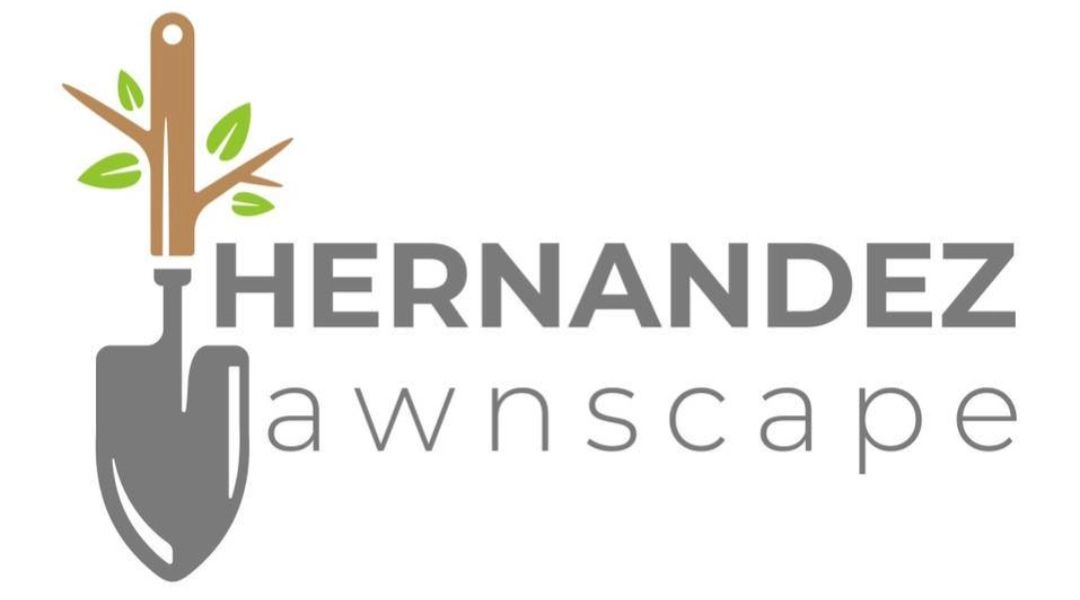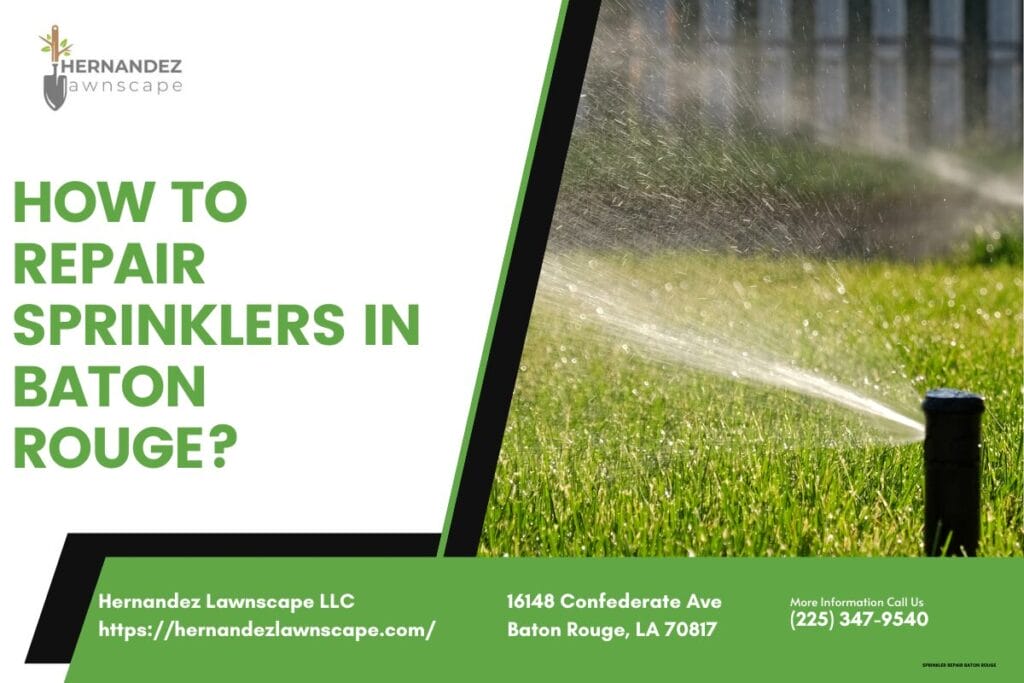A faulty sprinkler system in Baton Rouge is more than an inconvenience; it’s a battle against our unique climate. This guide provides a step-by-step framework for diagnosing common sprinkler problems specific to our area’s soil and weather. We’ll help you identify simple, inexpensive DIY repairs you can handle in an afternoon and recognize the critical signs that mean it’s time to call in a professional, saving you from paying for a service call on a five-dollar fix.
At Hernandez Lawnscape, we’ve spent over 15 years providing residential and commercial irrigation repair in Baton Rouge. We’ve seen firsthand how our local conditions can wreak havoc on even the best systems. We believe an informed homeowner is our best customer, so we’re sharing our field knowledge to help you take control of your lawn’s irrigation and your budget.
“I could not be more pleased with Hernandez Lawnscape. Excellent service all around…5 stars!”
The ‘Baton Rouge Breakdown’: Why Our Lawns Are Different
You can find generic sprinkler repair advice anywhere online, but it often fails here in East Baton Rouge and Ascension Parish. That’s because our environment presents a trio of challenges that directly impact your irrigation system.
Our Infamous “Gumbo” Soil
The dense clay soil that defines much of the Baton Rouge landscape is a major factor. This soil expands dramatically when wet and shrinks and cracks when dry. This constant movement puts immense stress on underground PVC pipes, causing joints to weaken and pipes to shift over time. It can also slowly swallow your sprinkler heads, causing them to sink below the grass line where they can’t pop up correctly. To be effective, your watering strategy must account for this. The dense nature of clay soil, common in the Baton Rouge area, absorbs water slowly, meaning sprinklers should be set for deep, infrequent watering cycles to prevent runoff and encourage deep root growth. This reduces the stress cycle on your system components.
Sudden, Heavy Downpours
Baton Rouge gets a lot of rain. In fact, Baton Rouge averages 63 inches of rain per year, significantly higher than the US average of 38 inches. These sudden deluges can wash away the soil supporting your sprinkler heads, causing them to tilt and misdirect their spray. More importantly, running your system during or right after a storm is a huge waste of water and money. A functional rain sensor isn’t a luxury here; it’s a necessity for any efficient automated lawn watering systems.
Heat, Humidity, and Corrosion
The persistent Louisiana humidity creates the perfect environment for corrosion. This is especially problematic inside your valve boxes, where sensitive electrical solenoids and wiring connections live. Over time, moisture can degrade these connections, leading to a frustrating situation where a sprinkler zone is not working for no visible reason. This is a common issue we see in our sprinkler maintenance services LA calls.
Your DIY Triage Checklist: Is This a 15-Minute Fix or a Professional Job?
Before you get a quote for sprinkler repair, run through this checklist. This process of sprinkler system troubleshooting will help you distinguish a simple DIY task from a problem requiring our team’s specialized equipment.
- The System Walk-Through: With the system off, walk through your yard. Look for heads that are obviously broken, cracked, or pushed deep into the turf. These are often the result of a lawnmower accident or foot traffic, and in fact, the most common type of sprinkler repair is a broken head.
- Run Each Zone Individually: Turn on your system, one zone at a time. Watch each head as it pops up.
- A Geyser or Major Leak: If you see a fountain of water around a single head, you likely have a broken head or a cracked riser beneath it. This is often a straightforward DIY sprinkler head replacement.
- Sputtering or Uneven Spray: Does the head gurgle or spray in a messy, inconsistent pattern? Clogged sprinkler heads, often caused by dirt and debris, can be diagnosed by observing an uneven spray pattern, sputtering, or gurgling. This is usually the easiest fix.
- Head Won’t Pop Up: A sprinkler that won’t pop up is often blocked by overgrown grass or sunken into the soil. It could also be a sign of a larger pressure problem.
- One Zone Completely Dead: If an entire zone fails to activate, the issue is likely not the heads but rather the valve for that zone or the electrical signal from the controller. This often requires professional troubleshooting.
- Assess the Signs of a Deeper Problem: Look for issues that point to a system-wide failure.
- Low Water Pressure Everywhere: If all your heads seem weak and aren’t spraying as far as they used to, you could have a crushed pipe, a failing backflow preventer, or a leak in your main irrigation line.
- A Zone Won’t Shut Off: A sprinkler that won’t turn off is a classic sign of a failed valve diaphragm or a stuck solenoid. This requires immediate attention to prevent massive water waste.
- Spongy, Wet Patches in the Lawn: If you find soggy areas in the lawn long after the system has run, you probably need to find a sprinkler leak underground. This requires specialized tools and expertise.
The Money-Saving Sweet Spot: Cost vs. Complexity
Understanding the potential cost of sprinkler repair in Baton Rouge helps you decide when to grab your tools and when to grab your phone. Here’s a general breakdown:
- Under $20 (The DIY Zone): This covers the vast majority of common issues. A replacement nozzle costs $2-$5. A complete pop-up spray head (like a Rain Bird or Hunter model) is typically $5-$15 at a local hardware store. Learning how to unclog a sprinkler nozzle or how to fix a broken sprinkler head yourself provides massive value.
- $85 – $250 (Consider a Pro): This is the typical range for a professional service call from a licensed irrigation contractor in Baton Rouge, including labor and parts for a single, more complex repair. This would cover a sprinkler solenoid valve replacement, fixing a leaking sprinkler valve, or troubleshooting sprinkler timer problems.
- $250+ (Definitely Call a Pro): Major repairs like finding and fixing a broken sprinkler pipe underground, resolving system-wide pressure issues, or complex electrical fault finding fall into this category. These jobs require expertise and specialized equipment to avoid causing more damage to your landscape.
The Right Tools for Baton Rouge’s Tough Turf
While basic pliers and a screwdriver are a start, working effectively in our compacted clay requires a few extra items in your toolkit:
- A Sturdy Hand Trowel or Hori-Hori Knife: Don’t use a flimsy garden trowel; it will bend. You need something strong to cut through the St. Augustine grass runners and dig into the clay.
- Small Trenching Shovel: For deeper repairs or replacing a section of pipe, this is invaluable.
- Replacement Heads and Nozzles: Keep a few matching your system on hand. This turns an emergency into a 15-minute task.
- Teflon Tape: To ensure a watertight seal on all threaded connections.
- Waterproof Wire Nuts: If you ever need to do an outdoor water line repair that involves wiring (like replacing a solenoid), these are non-negotiable to prevent corrosion.
“They always go a step beyond what I expect and consistently provide excellent service. Mr. Hernandez is honest and trustworthy… I highly recommend his company.”
Making the Right Choice for Your Needs
Ultimately, the best path forward depends on your comfort level, your budget, and the problem at hand. Here is our advice for different types of homeowners in the Baton Rouge area.
For the Frugal DIYer
If you’re hands-on and looking to save money, start with the triage checklist. The most common issues—clogged nozzles and broken heads—are well within your ability to fix. Learning how to adjust sprinkler heads to correct their spray pattern is a fantastic skill to have. Stocking a few extra parts specific to your system (e.g., Hunter or Rain Bird) can save you a trip to the store and turn a frustrating leak into a minor inconvenience.
For the Cautious Diagnostician
You want to understand the problem before you commit to a repair bill. Use this guide to narrow down the possibilities. If you suspect a bad valve because one zone won’t turn on, you can call us and say, “I think I have a valve issue in my front flower bed.” This leads to a more efficient service call and shows you’ve done your homework. A confident diagnosis on your part helps us provide a more accurate quote over the phone.
For the New Baton Rouge Resident
Welcome to the neighborhood! If you’re unfamiliar with the challenges of our clay soil and high rainfall, your best first step is a professional irrigation system audit. A member of our team can walk your property, test every zone, program your irrigation controller for our specific seasons, and teach you about your system. This small investment can prevent costly water waste and future landscape drainage issues, ensuring your lawn thrives from day one.
Understanding your irrigation system is the first step toward a healthy, beautiful lawn and responsible water management. Whether you’ve used this guide to solve the problem yourself or you’ve decided you need an expert eye, the goal is a system that works efficiently for your specific Baton Rouge landscape. For a professional, honest assessment and a reliable quote, our team of local sprinkler repair experts is ready to help. Contact Hernandez Lawnscape today to schedule your service.

